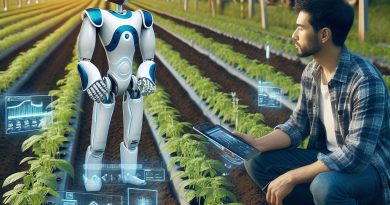AI in Farming: Revolutionizing Crop Management
Last Updated on December 13, 2023
Introduction
Let’s explore AI crop management farming.
Brief explanation of AI (Artificial Intelligence)
AI refers to the ability of machines to perform tasks that normally require human intelligence.
Overview of the importance of crop management in farming
Efficient crop management is crucial for maximizing yield and minimizing losses in agriculture.
Thesis statement -AI has the potential to revolutionize crop management in farming
With its advanced capabilities, AI can transform traditional crop management practices and yield better results.
In recent years, agriculture has witnessed significant advancements in technology, one of the most promising being Artificial Intelligence (AI).
AI, defined as the ability of machines to perform tasks that typically require human intelligence, holds immense potential for revolutionizing crop management in farming.
Crop management plays a pivotal role in agricultural practices as it directly influences yield, quality, and overall profitability.
Effective management involves crucial tasks such as monitoring crop growth, assessing soil conditions, detecting diseases, and optimizing resource allocation.
Traditionally, farmers relied on manual labor and experienced judgement to tackle these challenges.
However, with the advent of AI, the scope for improving crop management has grown exponentially.
AI-enabled technologies offer augmented insights and analysis that aid in making informed decisions.
Machine learning algorithms can process vast amounts of data, including weather patterns, soil compositions, and historical crop performance, to provide farmers with real-time and accurate information.
This data-driven approach enables farmers to optimize irrigation, fertilizer usage, and pest control, resulting in higher yields and reduced costs.
AI-powered systems can identify crop diseases and pest infestation at early stages, helping farmers take timely preventive measures.
With image recognition and deep learning algorithms, these technologies can swiftly diagnose issues, recommend treatment strategies, and minimize damage.
In short, AI has emerged as a game-changer in crop management, offering farmers new avenues for improving productivity and sustainability.
By harnessing the power of AI, farmers can make more informed decisions, optimize resource allocation, and revolutionize their farming practices.
As AI continues to advance, its impact on agriculture is bound to reshape the industry’s future.
Benefits of AI in Crop Management
Increased productivity and efficiency
- AI-powered machines can perform tasks faster and more accurately.
- Precision agriculture techniques optimize resource allocation.
Improved decision-making
- AI algorithms analyze vast amounts of data and provide actionable insights.
- Real-time monitoring and predictive analysis enable proactive measures.
Enhanced sustainability and environmental impact
- AI aids in reducing chemical usage and waste.
- Precision farming reduces soil erosion and water wastage.
AI revolutionizes crop management with benefits such as increased productivity, efficiency, and improved decision-making.
Precision agriculture optimizes resource allocation through AI-driven analysis of crop health, growth patterns, and soil conditions.
Real-time monitoring and predictive analysis enable proactive measures for seed selection, irrigation schedules, and pest control.
AI contributes to sustainability by reducing chemical usage and waste, accurately assessing pest and disease threats.
Precision farming techniques minimize soil erosion by managing irrigation and fertilization, preventing nutrient runoff.
AI integration in crop management brings numerous benefits, addressing challenges and contributing to sustainable agriculture.
Read: Sheep Flock Care: Top Strategies & Insights
Applications of AI in Crop Management
Crop monitoring and disease detection
- AI-powered drones and satellites capture high-resolution imagery.
- Computer vision algorithms identify crop health issues and diseases.
Automated irrigation and nutrient management
- AI sensors detect soil moisture levels and adjust irrigation accordingly.
- Machine learning algorithms optimize nutrient application based on crop requirements.
Weather and climate prediction
- AI models analyze historical data and predict weather patterns.
- Accurate weather forecasts help farmers plan their crop management activities.
AI technology is revolutionizing the agricultural sector, particularly in crop management.
By incorporating artificial intelligence (AI) into farming practices, farmers can enhance crop yields, reduce resource wastage, and improve overall efficiency.
In this blog section, we will explore the various applications of AI in crop management.
Crop monitoring and disease detection
One of the key applications of AI in crop management is through crop monitoring and disease detection.
AI-powered drones and satellites capture high-resolution imagery of the fields, providing farmers with detailed insights into their crops.
Computer vision algorithms are then employed to analyze these images and identify any crop health issues or diseases present.
This allows farmers to promptly address these issues, preventing potential crop damage and yield loss.
Automated irrigation and nutrient management
AI technology also plays a vital role in automated irrigation and nutrient management. AI sensors are used to detect soil moisture levels in real-time.
This data is then utilized to automatically adjust irrigation systems according to crop requirements, ensuring optimal water usage.
Machine learning algorithms analyze crop data and optimize nutrient application, ensuring that the right amount of nutrients is provided to the crops at the right time.
Weather and climate prediction
Weather and climate conditions have a significant impact on crop growth and productivity.
AI models analyze historical weather data and predict future weather patterns, providing farmers with accurate weather forecasts.
This information enables farmers to plan their crop management activities, such as planting, fertilization, and harvesting, accordingly.
By aligning their practices with the predicted weather conditions, farmers can optimize their yields and minimize losses caused by unfavorable weather events.
In fact, AI has transformed crop management in the agricultural industry.
Its applications in crop monitoring and disease detection, automated irrigation and nutrient management, as well as weather and climate prediction, have revolutionized farming practices.
As AI continues to advance, farmers can expect improved yields, reduced resource consumption, and increased sustainability in their operations.
Read: 5 Essential Tips for Healthy Cattle Rearing
Challenges and Limitations of AI in Crop Management
AI in farming has the potential to revolutionize crop management, but it also faces certain challenges and limitations.
These factors need to be addressed to maximize the benefits of using AI in agriculture.
High initial investment and infrastructure requirements
- The implementation of AI technology in crop management requires a significant initial investment.
- Farmers need to invest in advanced hardware, software, and specialized sensors to gather data.
- Setting up the necessary infrastructure to support AI systems can be costly and time-consuming.
- However, the long-term benefits of AI, such as increased productivity and efficiency, can outweigh the initial costs.
- Government subsidies and support can help make AI technology more accessible to farmers.
Data privacy and security concerns
- AI in crop management relies heavily on data collection and analysis.
- There are concerns about the privacy and security of sensitive agricultural data.
- Farmers may hesitate to share their data with AI systems due to the risk of unauthorized access.
- Ensuring robust data encryption and secure storage systems are crucial to address these concerns.
- Strict regulations and guidelines should be in place to protect farmers’ data privacy and prevent data breaches.
Limited accessibility for small-scale farmers in developing regions
- AI technology is often inaccessible to small-scale farmers in developing regions.
- These farmers usually lack the financial resources and technical expertise required to implement AI systems.
- High-speed internet connectivity, which is necessary for AI systems, may not be available in remote areas.
- Training and educational programs should be provided to help small-scale farmers integrate AI into their practices.
- Partnerships between governments, international organizations, and technology companies can facilitate the adoption of AI in these regions.
In essence, while AI has the potential to revolutionize crop management, several challenges and limitations need to be addressed.
High initial investment costs and infrastructure requirements, data privacy and security concerns, and limited accessibility for small-scale farmers in developing regions are among the key hurdles that must be overcome.
With proper support, regulation, and collaboration, AI can transform agriculture and help achieve sustainable and efficient crop management on a global scale.

Case Studies: Successful Implementations of AI in Crop Management
Case study 1: XYZ AgTech’s AI-driven crop monitoring system improved yield by 20%
XYZ AgTech, a leader in agricultural technology, implemented an AI-driven crop monitoring system to revolutionize crop management.
By utilizing AI algorithms, they were able to collect and analyze vast amounts of data from sensors placed throughout the fields.
This AI-powered system continuously monitored various factors such as soil moisture, temperature, and nutrient levels.
The data collected was then processed in real-time, providing valuable insights to farmers.
The implementation of this technology led to a significant improvement in crop yield.
By accurately analyzing the data, XYZ AgTech’s system allowed farmers to optimize irrigation schedules, fertilization plans, and pest control measures.
As a result, the overall yield of crops increased by an impressive 20%.
This meant that farmers could produce more food and meet the growing demands of the population.
Case study 2: ABC Farm’s utilization of AI-powered weather predictions reduced losses by 15%
ABC Farm faced significant challenges due to unpredictable weather patterns.
To address this issue, they adopted AI-powered weather prediction models, which provided accurate forecasts tailored to their specific location.
By integrating these predictions with their crop management system, ABC Farm was able to make informed decisions ahead of time.
They could adjust planting schedules, choose appropriate crop varieties, and take preventative measures to minimize losses.
The AI algorithms analyzed historical weather data, current conditions, and various environmental factors to generate forecasts with high accuracy.
These predictions gave ABC Farm a competitive advantage in adapting and planning for weather-related challenges.
As a result of employing this AI technology, ABC Farm successfully reduced their losses by 15%.
The ability to anticipate adverse weather conditions enabled them to take proactive measures and protect their crops, resulting in significant cost savings.
Case study 3: DEF Co-op’s implementation of AI-based irrigation management increased water efficiency by 30%
DEF Co-op, a cooperative of farmers, recognized the importance of conserving water resources for sustainable agriculture.
They implemented an AI-based irrigation management system to optimize water usage.
This advanced system utilized AI algorithms to analyze data from soil moisture sensors, weather forecasts, and crop water requirements.
By collecting real-time data, the AI was able to determine the precise amount of irrigation needed for each field.
DEF Co-op’s farmers no longer had to rely solely on guesswork or traditional schedules.
Instead, they received accurate and timely recommendations from the AI system, improving water efficiency.
The implementation of this AI technology resulted in a remarkable 30% increase in water efficiency.
This allowed DEF Co-op to conserve water resources, lower irrigation costs, and contribute to sustainable farming practices.
These case studies highlight the successful implementation of AI in crop management, showcasing the tangible benefits it brings to farmers.
The use of AI-driven crop monitoring systems, AI-powered weather predictions, and AI-based irrigation management have revolutionized traditional farming practices.
These technologies not only improve yield and minimize losses but also contribute to sustainable and efficient farming practices.
Read: Climate-Smart Agri: Tech Against Climate Change
The Future of AI in Crop Management
Potential advancements and innovations
- Integration of AI with robotics for autonomous farming.
- Expansion of AI applications in pest control and weed management.
Collaboration between technology companies and farmers for continuous improvements
The future of AI in crop management holds immense potential for advancements and innovations.
One exciting possibility is the integration of AI with robotics, enabling autonomous farming.
With AI algorithms and sensors, robots can perform tasks such as planting and harvesting crops with precision and efficiency.
This integration can revolutionize the agricultural industry, increasing productivity and reducing labor costs.
AI can extend its applications beyond yield optimization to areas like pest control and weed management.
By utilizing machine learning algorithms, AI systems can identify and differentiate between invasive species and beneficial ones.
This enables targeted intervention strategies, minimizing the use of harmful pesticides and herbicides.
Collaboration between technology companies and farmers will be crucial for the continuous improvement and adoption of AI in crop management.
Farmers can provide valuable insights and feedback to technology companies, helping them develop more effective AI solutions.
In return, technology companies can offer tailored technologies and tools that address specific farming challenges.
Through this collaboration, both farmers and technology companies can work together to overcome obstacles and optimize crop production.
Policymakers also play a vital role in promoting AI adoption in crop management and addressing concerns surrounding it.
They can create supportive policies and regulations that encourage the development and deployment of AI technologies in agriculture.
Policymakers should foster an environment that prioritizes data privacy, security, and ethical considerations.
Additionally, they can support initiatives that promote the education and training of farmers in AI technologies.
By doing so, policymakers can enable widespread AI adoption, ensuring its benefits are accessible to all farmers.
Therefore, the future of AI in crop management looks promising.
Integration with robotics, expansion of AI applications, collaboration between technology companies and farmers, and the role of policymakers are key factors shaping this future.
With the right advancements and support, AI has the potential to revolutionize crop management, enabling sustainable and efficient agriculture for years to come.
Read: Livestock Tech: Innovations in Animal Farming
Conclusion
Recap of the benefits and applications of AI in crop management
Throughout this blog sections, we have explored how AI is revolutionizing crop management.
We discussed its potential to optimize irrigation systems, detect diseases, predict yield, and enhance overall crop quality.
AI offers a higher level of accuracy and speed, allowing farmers to make informed decisions.
Emphasis on the potential of AI to revolutionize agriculture
The integration of AI technology in farming has the potential to transform agriculture as we know it.
By leveraging machine learning algorithms, farmers can enhance their productivity, reduce costs, and minimize environmental impact.
AI empowers farmers to achieve sustainable and efficient crop management practices.
Call to action for farmers and stakeholders to embrace AI for sustainable and efficient crop management
It is imperative for farmers and stakeholders in the agriculture industry to embrace AI technology.
By adopting AI, farmers can streamline their operations, make data-driven decisions, and increase overall profitability.
Furthermore, the use of AI can lead to sustainable farming practices that minimize resource waste and environmental damage.
In a nutshell, AI has the potential to revolutionize agriculture and bring about significant benefits in crop management.
By harnessing the power of AI, farmers can take a proactive approach towards sustainable and efficient farming practices.
It is time for the agricultural community to embrace AI and unlock its full potential for the betterment of crop management globally.


